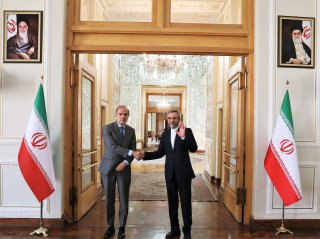Iran Nuclear Talks Resume After Months-Long Impasse
Enrique Mora, the European Union’s coordinator for the negotiations, indicated that the talks would resume with mediation from the EU.
Multilateral negotiations to revive the Joint Comprehensive Plan of Action (JCPOA) nuclear deal are scheduled to resume on Thursday in Vienna, following a months-long impasse and mutual recrimination between Iran and the United States over Washington’s “maximum pressure” sanctions campaign on Tehran.
Enrique Mora, the European Union’s coordinator for the negotiations, indicated that the talks would resume with mediation from the EU. Mora confirmed that their original format, in which Iran would negotiate with the combined “P5+1” powers—the five permanent members of the United Nations Security Council, plus Germany—would be resumed, although the EU would continue to run messages between Iranian and American negotiators, who will not meet. Mora also emphasized the participation of the Russian and Chinese delegations, and in the run-up to the new negotiations, Russian representative Mikhail Ulyanov vowed that Moscow would “stand ready for constructive talks in order to finalize the agreement.”
The impasse between the United States and Iran, which began in early 2022 over political issues only tangentially related to Iran’s nuclear accord, was unexpectedly broken in July after the EU High Representative for Foreign Affairs, the organization’s top diplomat, proposed a new text for discussions. Tehran and Washington separately indicated after Borrell’s announcement that the new text was acceptable, creating the broad outlines of a nuclear agreement and leaving finer details to be negotiated in Vienna.
Although both the United States and Iran have agreed in principle to a restoration of the JCPOA—with Iran agreeing to end its high-level nuclear enrichment and export its existing highly-enriched uranium stockpile in exchange for an end to U.S. nuclear-related sanctions—both sides have pushed the other to take the first step in negotiations. At the same time, Iran has pushed for the removal of the Islamic Revolutionary Guard Corps (IRGC) from the U.S. State Sponsors of Terror list. However, President Joe Biden has vowed not to do so and has suggested that he would rather allow the failure of the nuclear deal than remove the IRGC’s terror listing.
Iranian foreign ministry spokesman Nasser Kanani indicated on Wednesday that Tehran would approach the upcoming negotiations in good faith and urged the P5+1 to “create the conditions for effectively progressing the talks”—namely through “adopting necessary decisions and seriously focusing on resolving remaining issues.”
Before the renewal of discussions in Vienna, the United States and Iran held an additional round of talks in Doha, Qatar, but these ended in an impasse. In the weeks since, Washington has continued to implement additional sanctions against Iran, leading Tehran to further add to its uranium enrichment apparatus. Iran is thought to now have enough highly-enriched uranium to construct a nuclear weapon, although there is no evidence that it has done so.
Trevor Filseth is a current and foreign affairs writer for the National Interest.
Image: Reuters.

